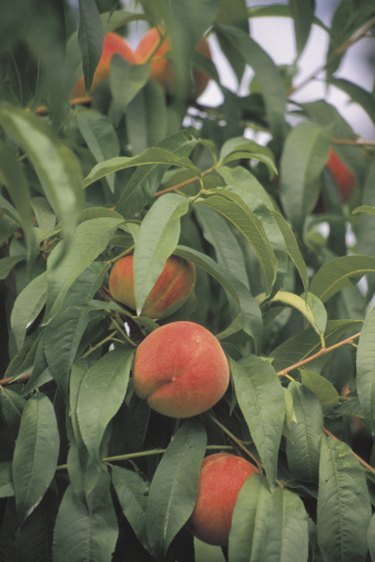
A slice of pie or cobbler made from freshly harvested peaches is one of the luxuries of an American summer. If you're fortunate enough to live in U.S. Department of Agriculture Hardiness Zones 5 through 8, a peach tree (Prunus persica) survives the winters and yields fruits anytime from May to August, depending on location. A sunny garden site with fertile, moist well-drained soil helps trees grow their best. A hot summer also improves development of the largest, sweetest fruits.
Age
Video of the Day
Horticulturists propagate and sell modern peach tree cultivars as grafted saplings. Peach trees are not grown from seed since there's no way of knowing the genetic qualities of such a tree until it matures. Initially, a single twig or whip describes the young peach sapling. Growers plant it and selectively prune or train it to develop a broad, open-structured canopy.
Video of the Day
Mark Rieger, fruit crop expert with the University of Georgia, calls peach trees "precocious" and some trees may flower and begin producing a few fruits two years after planting. Expect peach trees to fruit best when they are 4 to 12 years of age.
The Flowering Season
A peach tree produces fruits only if flowers form and they get pollinated by bees. Peach trees must be exposed to 500 to 1,000 hours of chilling, or winter dormancy temperatures at or below 45 degrees Fahrenheit.
Inadequate cold prevents formation of flowers in early spring. If blossoms are not killed by an untimely frost and bees successfully transfer pollen among the blossoms, fruit then forms. In the southern United States, peach blossoms open in late February to early March, while farther north the blossoms may not open until mid- to late April.
Fruit Development
Peach trees tend to yield an abundant crop of fruits. Within a month after flower pollination occurs, scores of quarter-sized fruits line the branches. Rieger states that roughly 30 to 45 days after flowering, growers thin out tiny peaches to one per 6-inch increment on branches. This lightens the weight load and allows fruits that remain to grow larger and develop better flavor and color. Small fruits remain light green and fuzzy and the leaves partially hide them.
Harvest
Of the many peach cultivars, horticulturists describe them as early, mid- or late season types, referring to when the fruits become ready for harvest. Early season peaches, such as 'Donut' and 'Redhaven', ripen in late May to mid-June. 'Harken', a mid-season cultivar, ripens in early July.
Once early August arrives, late season types such as 'Red Baron' and 'Tra-Zee' are ready to pick. Harvest time is relative to garden latitude and elevation. In the Deep South, harvest is earlier than on the same variety of tree north of the Ohio River, for example.